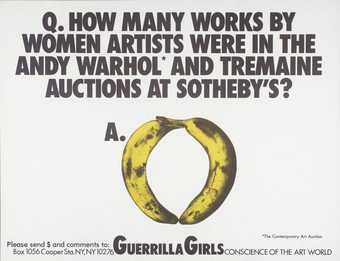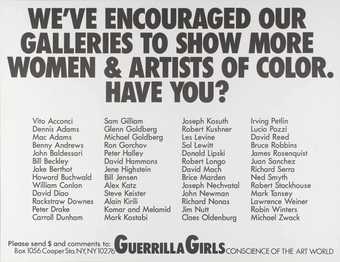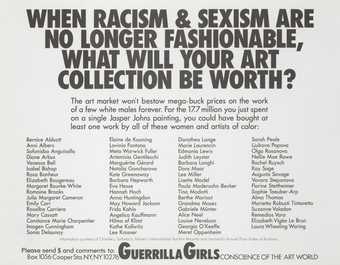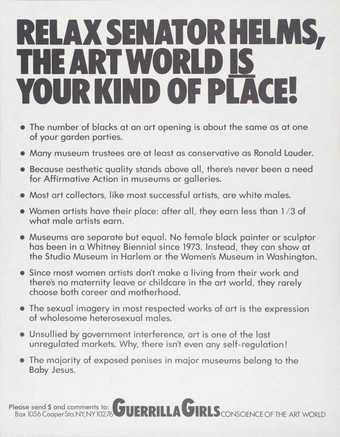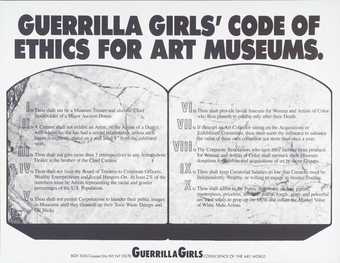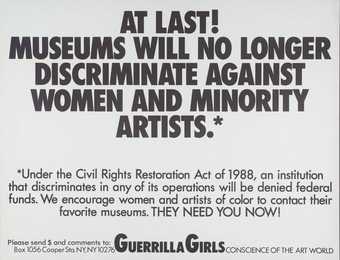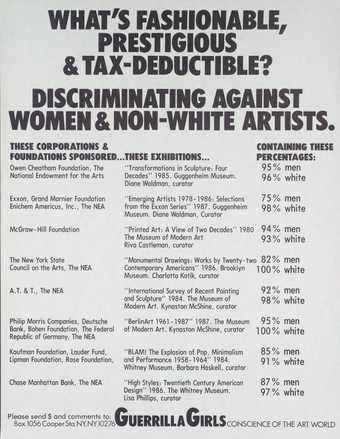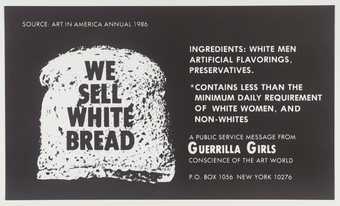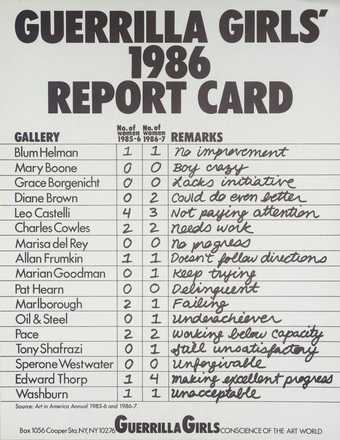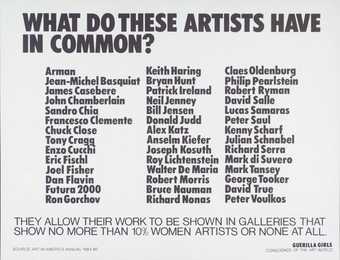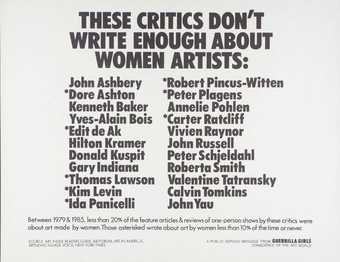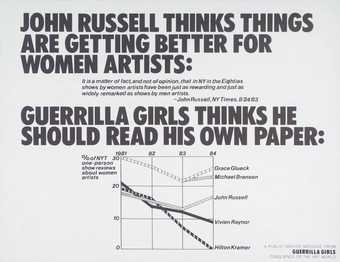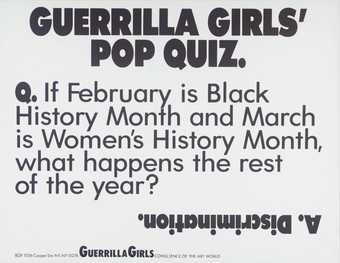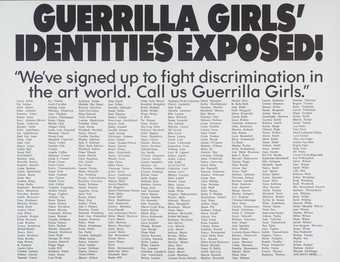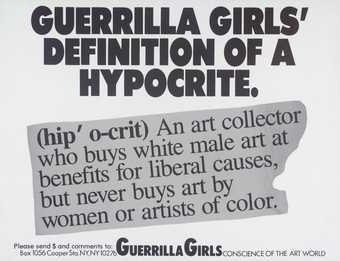
In Tate Modern
- Artist
- Guerrilla Girls
- Part of
- Guerrilla Girls Talk Back
- Medium
- Screenprint on paper
- Dimensions
- Image: 430 × 560 mm
- Collection
- Tate
- Acquisition
- Purchased 2003
- Reference
- P78796
Summary
This is one of thirty posters published in a portfolio entitled Guerrilla Girls Talk Back by the group of anonymous American female artists who call themselves the Guerrilla Girls. Tate’s copy is number twelve in the edition of fifty.
Since their inception in 1984 the Guerrilla Girls have been working to expose sexual and racial discrimination in the art world, particularly in New York, and in the wider cultural arena. The group’s members protect their identities by wearing gorilla masks in public and by assuming pseudonyms taken from such deceased famous female figures as the writer Gertrude Stein (1874-1946) and the artist Frida Kahlo (1907-54). They formed in response to the International Survey of Painting and Sculpture held in 1984 at the Museum of Modern Art, New York. The exhibition included the work of 169 artists, less than 10% of whom were women. Although female artists had played a central role in experimental American art of the 1970s, with the economic boom of the early 1980s in which artwork prices rose steeply, their presence in museum and gallery exhibitions diminished dramatically. Dubbing themselves the ‘conscience of the art world’, in 1985 the Guerrilla Girls began a poster campaign that targeted museums, dealers, curators, critics and artists who they felt were actively responsible for, or complicit in, the exclusion of women and non-white artists from mainstream exhibitions and publications.
Like American artists Barbara Kruger (born 1945) and Jenny Holzer (born 1950), the Guerrilla Girls appropriated the visual language of advertising, specifically fly-posting, to convey their messages in a quick and accessible manner. They pasted up their first posters on SoHo streets in the middle of the night. Combining bold block text with lists and statistics that were compiled by the Girls themselves or reinterpreted from existing sources such as art magazines and museum reports, the posters named New York galleries that showed no more than 10% women artists (Tate P78810) and listed successful male artists who allowed their work to be shown in galleries showing little or no work by women (Tate P78809). Other posters, such as ‘We Sell White Bread’ (1987, Tate P78800), first appeared as peel-off stickers on gallery windows and doors, while the 1989 poster that asked ‘Do women have to be naked to get into the Met. Museum?’ (Tate P78793) first appeared as an advertisement on New York City buses. With such posters as ‘Relax Senator Helms, the Art World is your kind of place (1989, Tate P78792) the Girls used wit and irony to point a critical finger at double standards prevalent in the art world and elsewhere.
The group gradually widened their focus, tackling issues of racial discrimination in the art world and also made more direct, politicised interventions. They organized forums at the Cooper Union where critics, curators and dealers could tell their side of the story (1986, Tate P78805), inserted flyers inside the covers of all the books in the Guggenheim Museum’s bookstore, and, concurrently with the 1987 Whitney Biennial, made an exhibition of information exposing the museum’s poor record on exhibiting women and artists of colour (Tate P78798). In 1992, at the opening of the Guggenheim Museum SoHo, after instigating a postcard-writing campaign attacking the museum for proposing to show only white male artists, they organized a demonstration, handing out bags with gorilla heads printed on them for protesters to wear over their heads. To date they have produced more than ninety posters, three books, numerous stickers and other printed projects and have undertaken actions about discrimination in art, film and politics. They make presentations and run workshops at schools, museums and various organisations. Their individual identities are always concealed behind the signature gorilla masks.
The is print is made from a poster created in 1988 titled ‘The Advantages of Being a Woman Artist’. The thirteen points listed are ironic in tone and include: ‘working without pressure of success’, ‘having the opportunity to choose between career and motherhood’,
‘being included in revised versions of art history’ and finally ‘getting your picture in the art magazines wearing a gorilla suit’.
Further reading:
Helena Reckitt and Peggy Phelan, Art and Feminism, London 2001, pp.12, 17, 42, 153 and 268
Liz McQuiston, Suffragettes and She-Devils, London 1997, pp.11, 114-15, 122-3, 140-1, 150-2 and 158
Whitney Chadwick, Guerrilla Girls, Confessions of the Guerrilla Girls, New York 1995, pp.52-3, reproduced p.53
Elizabeth Manchester
December 2004/February 2005
Does this text contain inaccurate information or language that you feel we should improve or change? We would like to hear from you.
Display caption
The Guerrilla Girls are an anonymous group of activist artists who highlight sexism and racism in the art world. They formed in 1985 in New York City, USA. Shortly after, their posters appeared overnight in the streets of the New York art district of SoHo. The group’s targets included artists, gallery owners, and museums. Over the years their focus has widened to include other areas of inequality. The Guerrilla Girls wear gorilla masks in public and use pseudonyms. They continue to expose discrimination and to produce new provocative posters. Their work now includes books, videos and workshops in schools, colleges and art institutions.
Gallery label, August 2021
Does this text contain inaccurate information or language that you feel we should improve or change? We would like to hear from you.
Film and audio
Explore
- abstraction(8,615)
-
- non-representational(6,161)
-
- text(1,043)
- emotions and human qualities(5,345)
-
- frustration(111)
- reading, writing, printed matter(5,159)
-
- poster(874)
- government and politics(3,355)
-
- feminism(116)
- inscriptions(6,664)
-
- printed text(1,138)
- arts and entertainment(7,210)
-
- artist - non-specific(2,109)
You might like
-
Guerrilla Girls Women Artists In The Andy Warhol And Tremaine Auctions At Sotheby’s
1989 -
Guerrilla Girls We’ve Encouraged Our Galleries To Show More Women And Artists Of Color. Have You?
1989 -
Guerrilla Girls Relax Senator Helms, The Art World Is Your Kind Of Place!
1989 -
Guerrilla Girls Guerrilla Girls’ Code Of Ethics For Art Museums
1990 -
Guerrilla Girls At Last! Museums Will No Longer Discriminate Against Women And Minority Artists
1988 -
Guerrilla Girls What’s Fashionable, Prestigious And Tax Deductable?
1987 -
Guerrilla Girls We Sell White Bread
1987 -
Guerrilla Girls Guerrilla Girls’ 1986 Report Card
1986 -
Guerrilla Girls What Do These Artists Have In Common?
1985 -
Guerrilla Girls These Critics Don’t Write Enough About Women Artists
1985 -
Guerrilla Girls John Russell Thinks Things Are Getting Better For Women Artists
1985 -
Guerrilla Girls Guerrilla Girls’ Pop Quiz
1990 -
Guerrilla Girls Guerrilla Girls’ Identities Exposed!
1990 -
Guerrilla Girls Guerrilla Girls’ Definition Of Hypocrite
1990

